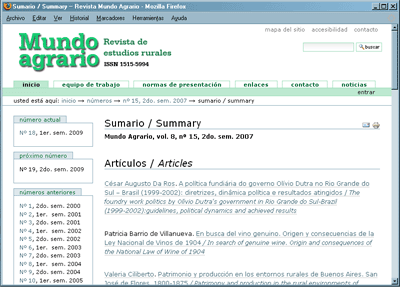"Let no miserable person starve to death": agriculture, reciprocity and re-elaboration of identities among the ranqueles in the decade of 1840
Main Article Content
Abstract
The picture of indigenous societies living in the pampas after the 16th. century - specially concerning its economy - has gone through a profound anthropological and historical revision during the past decades. The perspective that acknowledged only the diverse forms of predatory activities has been replaced for a wider look that recognizes the variety and complexity of indian productive organization. The purpose of this article - within this approach - is to analize the historical conditions that surrounded the incorporation of agricultural practices by the ranqueles in the 1840s, using as a main source a text describing the deep transformations experienced by that group, written by young captive Santiago Avendaño, and omitted in edited versions of his memoirs. After the tough defeats suffered during de 1830s, the ranqueles succeeded in reconstructing their weakened demographic and economic base, by means of incorporating borogano contingents, together with agricultural managements from beyond the Andes . The mixture of these and the traditional means resulted in a flexible and diversified complex that, combined with new comensal politics consisting in the extension of reciprocity bonds beyond their regular limits, was able to sustain the group's social recovery.
Downloads
Download data is not yet available.
Article Details
How to Cite
Jiménez, J. F., & Alioto, S. (2007). "Let no miserable person starve to death": agriculture, reciprocity and re-elaboration of identities among the ranqueles in the decade of 1840. Mundo Agrario, 8(15). Retrieved from https://www.mundoagrario.unlp.edu.ar/article/view/v08n15a09
Issue
Section
Dossier: Resistance and adaptation between the indigenous groups of pampa and patagonia (XVII and XIX centuries)
Works are released under a Creative Commons License (Creative Commons 4.0. Atribución-NoComercial-CompartirIgual) which provides unrestricted use, copy and redistribution in any medium or format and remix, transform and build upon the original work properly cited. The Creative Commons License stipulates that: "You must attribute the work in the manner specified by the author or licensor (but not in any way that suggests that they endorse you or your use of the work)."
